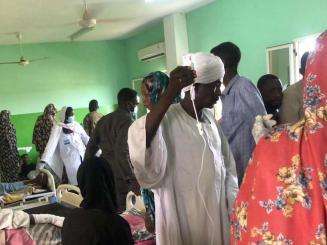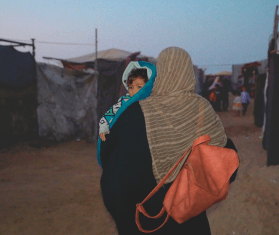NAIROBI/NEW YORK, April 26, 2023—Violence is continuing in many areas of Sudan following the outbreak of intense fighting on April 15 in the capital Khartoum and across much of the country. Doctors Without Borders/Médecins Sans Frontières (MSF) teams in Sudan report that hospitals are overwhelmed, and thousands of people are fleeing to safer areas. Immense humanitarian and medical needs are already evident.
In Khartoum, violence has made it extremely difficult to provide health care.
May 04 05:07 PM
How MSF is responding to the crisis in Sudan
Hospitals are overwhelmed and thousands of people have been forced to flee their homes in search of safety.
Read more
"During a lull in the fighting, MSF was able to make a donation of medical supplies to a health facility in Khartoum on April 23, and we are in contact with hospitals and Sudanese medical authorities and associations trying to supply additional hospitals and facilities within the capital," said Dr. Ghazali Babiker, MSF country director for Sudan. "However, the fighting is continuing to make this almost impossible."
Since the outbreak of intense violence, a large number of wounded people have arrived at the hospital MSF supports In El Fasher, North Darfur. Our teams are working round the clock to treat the injured— 404 people have so far made it to the hospital for treatment, which is now the only health facility that is operational in the city.
Thousands of people have fled southeast from Khartoum to Wad Madani. MSF teams, including staff from Khartoum and from our project in Damazin, are assessing how we can best begin to respond to the needs there.
Before the escalation in violence, MSF worked in Darfur, Khartoum, White Nile, Blue Nile, Al Jazeera, Al Gedaref, River Nile and Kassala states. MSF-supported facilities are continuing to treat patients in Damazin in Blue Nile State, Omdurman in Khartoum State, Kreinik and El Geneina in West Darfur, Rokero in Central Darfur, El Fasher in North Darfur, and Um Rakuba and Gedaref state in eastern Sudan.
We remain committed to providing much-needed health care to people in Sudan, especially during these challenging moments. But to do so, we need to be able to ensure safety and security for our staff and patients.
"Experienced MSF emergency teams stand ready to enter Sudan as soon as they are able to support the scale-up of our activities," said Kate Nolan, MSF deputy director of operations. "Other teams are currently preparing and identifying the best ways to send medical and humanitarian supplies to the country."
Sudan: "We are still hearing gunfire from our compound"
Read More
After more than a week sheltering from heavy fighting in Sudan, some of our teams have relocated to safer locations, while there are plans for others to leave the country. Some staff have also relocated with their families to safer areas, often joining family members. We continue to keep in close contact with all team members, as much as possible. The safety of our staff is a top priority, and we appreciate the support we received to safely relocate our teams.
"We reiterate our call for all those participating in the violence to respect their obligations under international humanitarian law to ensure the safety of medical personnel and health facilities, to allow safe passage of our teams, ambulances and civilians seeking health care, and to facilitate movement of those who are delivering humanitarian assistance," said Dr. Abubakr Bashir Bakri, MSF operations manager for Sudan.




